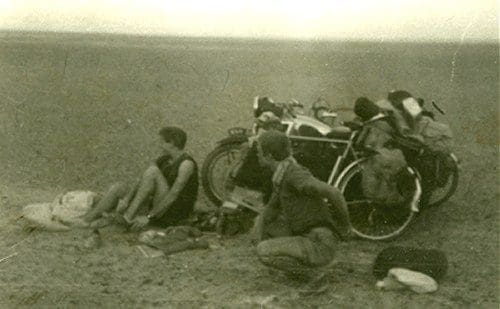
After travelling through the world’s troublespots two decades ago, Goat Maison finally made it to Pakistan aboard his pre-featherbed twin. But the going had been tough…
Weeks of travel through the desert had taken their toll. The jarring of the corrugations of the ‘road’ had caused the oil in the forks to disappear (I don’t know where it went) and seize up, and the rear swinging arm mounting holes had become elongated to give a sloppy back end (nothing to do with poo).
I was still falling off quite often and it took all of my energy sometimes to kick the bike off my leg to get free, and then lift the bike up fully laden. I’d also not eaten much for several weeks and looked like a war refugee myself, covered in filth and stinking like a hog.
I met two English cyclists who were heading to Everest Base Camp from Derbyshire. We tied a rope from the back of the Norton and I towed them for a few miles across the desert until one of them caught my back wheel and ended up in a heap. As I headed towards Quetta, the engine started to misfire so I stopped and found that one of the magneto brushes had fallen off its spring and only one cylinder was firing. No problem. ‘Planning and preparation’ meant that I had cunningly packed spare brushes inside the headlamp – except that I’d forgotten to pack them!
It was a Homer Simpson moment.
There are so many times that I’ve been out on a bike and the engine packs up. Typically it will be in the green lanes of Southern England and I’ll search around the kerbside until I find a bit of wire or string or anything that will help me to limp the bike home. It’s one of the things that I like most about riding old bikes and it help to keep the creative mind alive. In the Baluchistan desert, there is sand and there are stones, but no 1950s Lucas magneto brushes that some earlier traveller may have dropped.
Light bulb: I then remembered overhearing someone (deep in my unconscious consciousness) say that these magnetos can run without the earth brush. I did a swap and had a pair of cylinders running again. Triumph! (Well, Norton 77, actually).
 Quetta has an enduring background aroma of two-stroke exhaust and dusty donkey poo which is punctuated by other, more astonishing smells. In Quetta, I was greeted by Richard and Julie who were expecting me.
Quetta has an enduring background aroma of two-stroke exhaust and dusty donkey poo which is punctuated by other, more astonishing smells. In Quetta, I was greeted by Richard and Julie who were expecting me.
They’d heard that there was an English lunatic with a 1950s Norton en route and we fast became friends. Emigrating from England to Australia, they had ridden a similar route to me on a very shiny BMW RT100 spaceship which had been put on a train from Tehran to avoid the desert section, and were getting ready for the ride to Delhi which we agreed to do together.
Quetta was a surreal place for me and was my first time on the subcontinent. The food passed through me so quickly that sometimes I barely had time to pay the bill before running for the squat room. The waiters were stoned most of the time and laughed when we placed an order. Sometimes it came and sometimes not. They lived on the roof and we gave them names like ‘flock of birds’ and ‘dopey’.
|
We ate dahl, bindhi, boiled eggs with rice and flat bread mostly and for a special treat everyday we’d go out for a mango lassi before taking a long afternoon siesta during the hottest part of the day. The BMW was in top condition and the Norton looked like it had come through a bomb blast. Quetta was a good place to stop and gather strength. I shared a room with an Australian/Afghan truck driver who seemed to have a wife or woman in every port and knew everything about smuggling and war. He ran cargo from Germany to Pakistan, usually on a truck with a smaller truck on the back which had a car on top, with every storage space full of old TVs, fridges and any other cast-offs from Europe that even the Poles didn’t want. They all had value out here. He would take back semi-precious stones that he’d buy from the Afghans. He took us to dinner with the Mujahadeen fighters one evening: they’d spend a couple of weeks fighting and then rest for a couple of weeks in Quetta. The table was low and had a huge mound of rice in the middle and a plate piled high with flat breads. Everyone put their hand into the rice to pull off some meat from the mutton carcass that was hiding inside. This is such a civilised way to eat. |
 Quetta became like home after a while. We knew a lot of people there and became minor celebrities, but it was time to go so we headed out of town one morning aiming to cross the Indus at Sukkur.
Quetta became like home after a while. We knew a lot of people there and became minor celebrities, but it was time to go so we headed out of town one morning aiming to cross the Indus at Sukkur.
Slowly the landscape changed to low desert mountains and about an hour out of town a truck came around a corner and into Richard’s path.
At this point everything went into slow motion.
The fairing exploded into fragments as the BMW hit the side of the truck and by the time I hit my brakes, I was sliding in the oil that had come from the BMWs fractured engine.
I ended up still standing with the Norton on its side between my legs. Richard and Julie were both lying on their backs by the side of the road and the truck had stopped. There was a moment of timelessness that seemed to hang in the air. We were still in slow motion. The truck driver and his companions were looking at the mess and were looking at me. There was some conferring. They probably didn’t know the song ‘Should I leave or should I go?’ I can only guess that because it looked like I would be able to pursue, that they stopped rather than driving off.
Richard and Julie were mostly all right but their spaceship was broken. The broken spaceship went on the back of the truck back to Quetta where we spent another week or so. Richard endured his visit to the Quetta hospital which he said was like an abattoir. They had run out of budget, as they did every year two months after it arrived, and his knee was sewn up with a needle from his sewing kit, which was better than the hospital’s remaining blood-encrusted needle.

One day we were invited to a Red Cross aid workers’ party and saw how the other half lives. We took two motor rickshaws (which look like daleks) which ended up racing each other. At the bend where we crossed the railway line the drivers were elbow to elbow and I could feel the wheel lift for a moment. Behind the compound’s high walls, there was a sumptuous green grass lawn (with a swing), food to make your eyes pop out of their sockets, fine wines and lots of posh white people. The cultural shock was both pleasant and disconcerting at the same time. When we left the gates, we were back in Pakistan. Everything was dusty and beaten up.
Word had got through to Quetta that there was a Sikh uprising in Amritsar, which was the only land crossing open between Pakistan and India. I didn’t immediately know it, but that was the end of the riding for me too. Richard and Julie headed off (with broken spaceship) to Karachi and I sent the Norton back to Hatch End via sea cargo. I carried on using public transport and arrived back in the UK sixteen months later. The BMW spaceship was made well in Sydney and then sold. The Norton has been restored recently and is well again and now lives in Combe Martin, Exmoor.
So the next time someone tells you that there is no such thing as a Norton 77, you’ll know otherwise.





